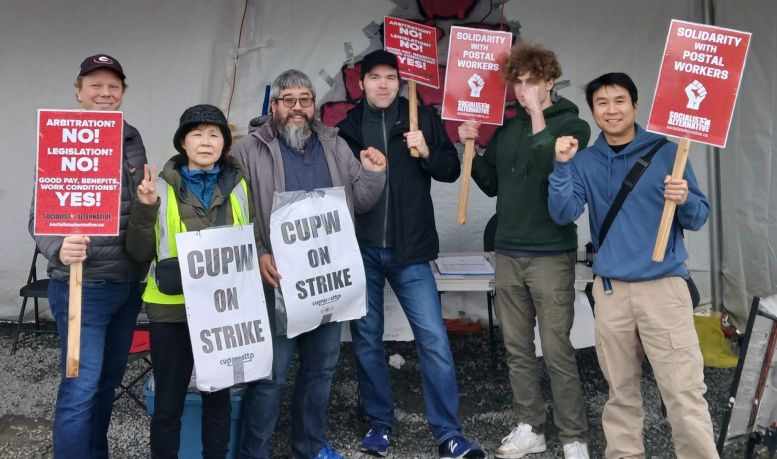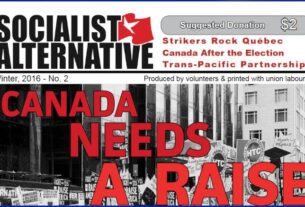The Liberal government has ended the strike of 55,000 postal workers with an underhand use of an obscure clause, Section 107, of The Canada Labour Code. They used the same tactics to attack rail and port workers.
In all three cases the bosses made unreasonable demands, attacking working conditions and jobs and then refusing to negotiate, waiting for the government to come to their aid.
CUPW Leadership Winds up Strike
On Friday, December 14, federal labour minister Steven MacKinnon instructed the Canada Industrial Relations Board (CIRB) to “assess the likelihood” of a negotiated agreement this year. The board, to no one’s surprise, stated that that an agreement was unlikely and ordered an end to the four-week strike of 55,000 members of the Canadian Union of Postal Workers (CUPW). Upon the instructions from the Minister of Labour, postal workers’ existing contract was unilaterally extended to May 22, 2025.
The decision left postal workers confused and angry that the government is taking away their rights to negotiate a collective agreement. The union leadership, calling the government action “an abuse of power,” nevertheless acquiesced to the CIRB ruling and on Tuesday, December 17, most CUPW members reluctantly ended their strike and returned to work. On picket lines and at union locals across the country, workers wanted to continue the strike and there was some short-lived defiance of the CIRB order. On some picket lines, solidarity pickets from other unions and allies briefly delayed workers going back to work, until police arrived.
The union leadership quietly wound up CUPW’s longest strike since the six-week walkout in 1975. This capped off a painful, though not back-breaking, setback for postal workers and the broader labour movement that was over a year in the making.
Meaningless Negotiations
Negotiations for a new collective agreement were a mockery from the start, starting over a year before the strike began on November 15. The union leadership hoped it could freely negotiate a collective agreement for the first time since 2016 — Parliament had imposed a contract in 2018, which was extended in 2021. Despite the soaring cost of living, postal workers had not received any pay increase to cover inflation. The union’s reasonable demands included a 24 percent wage increase over four years (in part to catch up for what had been lost over the last decade) and for weekend work to be done by full-time staff.
The response of the bosses at Canada Post was an all-out attack. They proposed an insulting 11.5 percent pay increase. Along with this they wanted to attack the postal workers jobs and conditions, with a big increase in part-time and casual labour.
Canada Post has increased the workload, which, along with the impacts of climate change, has resulted in increased injuries at work. Government data shows that postal work is one of the four most dangerous occupations for disabling injuries. Casual and part-time workers will not have the same training or rights to protect them from injury.
The government appointed a mediator who met with both sides for several days in November, but stated on November 27 that mediation would not succeed as “the parties remain[ed] too far apart on critical issues.”
On December 9, the union met with Canada Post with some new and more modest proposals. Following the meeting, union president Jan Simpson released a statement saying that we have “waited far too long for Canada Post to bargain in good faith. True progress requires meaningful engagement, not surface-level proposals, or new demands that derail progress.” The union reduced its wage demand to 19 percent and softened its positions on part-time work and time off. Canada Post did not move an inch toward the union and even threatened to worsen its own offer. They were waiting for the government to intervene.
Abuse of Section 107
The Liberals have found in Section 107 a new weapon to attack unions and the right to strike. The clause states: “The Minister, where the Minister deems it expedient, may do such things as to the Minister seem likely to maintain or secure industrial peace and to promote conditions favourable to the settlement of industrial disputes or differences and to those ends the Minister may refer any question to the Board or direct the Board to do such things as the Minister deems necessary.”
Until this year, no one, including the last Conservative government, understood that this clause gave the minister the power to interfere in collective bargaining. Lisa Raitt, labour minister under Stephen Harper, said: “If you find a lawyer who can tell you that it’s possible [for the minister to order the parties into arbitration], then I wish I had their advice 15 years ago. But as far as I’m concerned, you aren’t able to do that.”
In the past, governments used back-to-work legislation to stop strikes, including the Liberals against postal workers in 2018 and the Conservatives in 2011. However, the Supreme Court of Canada ruled in 2015 that the right to strike is an “indispensable component” of collective bargaining and is protected in the Canadian Charter of Rights and Freedoms.
The Liberals did not want to bring forward legislation as it would clearly show the hypocrisy of their claim to be worker friendly, and it would most likely be defeated. The NDP would vote against it. Poilievre is pretending to be pro-worker, so the Conservatives would also probably vote against such legislation, although, when Poilievre was in Harper’s government, he fully supported back-to-work legislation.
In addition to postal workers, the Liberals used Section 107 against port, railway and airline workers in 2024. In late June, the labour minister directed the CIRB to impose binding arbitration on mechanics at WestJet. However, the government did not specify that there should not be a strike. The mechanics (members of the Aircraft Mechanics Fraternal Association) stayed out, forcing WestJet to agree very quickly to a substantial wage victory.
In August, the Liberals saved their friends in the boardrooms of the CN and CP rail companies, who had locked out members of Teamsters Canada Rail Conference. The Liberals, having learned a lesson, directed that the lockout end and the workers go back on the job. They are now stranded in arbitration until March 2025.
Again, the lockouts in November of the dock workers in Montreal (CUPE Local 375), in Québec City (CUPE Local 2614) and on BC’s coast (International Longshore and Warehouse Union Shop & Dock Foremen Local 514), were blocked by a directive from the labour minister.
This time around, the federal government did not order arbitration or simply order workers back to work. It appointed an Industrial Inquiry Commission to examine the “structural issues preventing the resolution of the current labour dispute,” ordering the Commission to submit a report outlining their findings and recommendations by May 15, 2025 (one week before the expiry of the current collective agreements). Meanwhile, CUPW continues its negotiations with Canada Post, warning that “this will turn negotiations even more adversarial” and that “once again, postal workers’ Charter-protected rights to collective bargaining …. have been trampled on.” Negotiations over structural changes should be part of the collective bargaining process, not the purview of an independent inquiry. Calling this “yet another abuse of government power,” the union vowed to “stand strong and continue to fight.”
CUPW Leadership
Even before the strike began it was clear that the bosses at Canada Post had no intention to improve the pay and conditions of the workers. Rather, they were determined to ensure a “flexible” workforce, making structural changes that would attack workers. Once the strike began, it was widely expected that at some stage the government would use Section 107, given that they had successfully got away with it before.
Canada Post itself used dirty tactics. In addition to the lack of serious negotiations, the company served temporary layoff notices to approximately 328 workers, some on the first day of the strike. CUPW successfully challenged and reversed these layoffs on December 11. However, the company also denied members short-term disability payments from November 15 to December 17, and this was accepted by the Labour Board.
Canada Post’s bosses were hoping for favours as swift as the rail and port bosses had been given. Canada Post president Doug Ettinger (annual salary: over $500,000) and the workers were both surprised that it took MacKinnon this long to act, considering the earlier precedents.
Despite all this, the leadership of CUPW had no plan to escalate the strike or how to respond if ordered back to work (with or without arbitration). Workers on the picket line welcomed that this was a strike that shut down the mail, in contrast to the rotating and partial strike actions of 2018 and 2011 which “only slowed deliveries down for a day,” according to one worker. (Letter carriers did make exceptions to the total shutdown, delivering pension and social assistance cheques.) There were no national days of protest called, in which members of other unions and supportive members of the public at large could join with and express their support for the posties in a way beyond delivering doughnuts or honking a car horn at a picket line. Strikers, on the line for weeks where little seemed to change, were exasperated by a lack of communication either from the national centre or even some locals. While regular bulletins were sent out to workers on the progress of negotiations, and locals voted on amended demands, some members wanted more communication. A well informed and involved membership is the foundation of a strong union and, along with a clear and determined strategy, is the best guarantee of a successful struggle.
As countless unions (including those of the rail and port workers) agree, CUPW says that the CIRB’s back-to-work order is unconstitutional. The order should be fought against, but courts and tribunals are essentially the worst venue to challenge the power of the capitalist state. CUPW won acknowledgement that the legislation that forced a contract upon them in 2011 was unconstitutional… a ruling rendered in 2016. The state and the employers it serves will always be willing to drag things through the legal system, even (or especially) if they know they’re completely on the wrong side of the law. Unions accept battle on that ground — where the energy and ideas of the membership are completely neutralized — at their peril.
The NDP and its leader, Jagmeet Singh, loudly proclaimed that he would never vote to force workers back to work, knowing full well that the Liberals would take another path. When they did, he offered no leadership or resistance against the CIRB, implicitly accepting the lie of its “independence” and moving on, powerlessly.
The Liberal government is on the ropes — it is in its death throes. If the CUPW leaders had refused to go back to work, it would have gained a response from the members. The 1965 strike that won the right to organize was illegal. An appeal to rail and port workers, also attacked by the Liberals’ use of Section 107, could have gained a response that would have forced the employer and government to retreat.
Postal workers, who are dissatisfied with the outcome of the strike, will discuss and draw lessons from what happened and work to build a stronger union and a more determined leadership that has a strategy to win strikes. CUPW has a proud history of fighting for all workers, such as winning parental leave in 1981. That tradition will need to be built to stand up against the attacks of Canada Post bosses and both Liberal and Conservative politicians.
Canadians Need the Post Office
Canada Post constantly cried poverty and that it had an outdated business model (for which its executives, not its workers, are responsible). One PR trick it attempted was pretending that major capital investments, such as $400 million to build a huge new facility in Scarborough, were simple losses. A “dying business,” which was how many capitalist commentators described the postal system, does not make such large investments in the future.
Business groups such as the Canadian Federation of Independent Business also weighed in on management’s side, claiming that the strike had cost small firms over $1 billion and imploring the government to do what it eventually did. They never criticized the bosses.
The strike made very clear that Canada Post is a vital service to Canadians. Small and rural communities rely on it. Most small businesses (79 percent) rely on Canada Post. Many were horrified at the costs when they discovered the prices charged by private-sector delivery companies like FedEx and UPS. A rural Ontario woman was told that sending a Christmas card to her son in Vancouver through these services would cost $57 to $62 (in contrast to a Canada Post-delivered card at $1.40). Canadians need a universal national postal service. Only a public service can deliver this, as a privatized Post would only be interested in profits and so would cherry-pick some areas to deliver to and leave others to suffer.
The bosses at Canada Post want to cut deliveries, bring in more low-paid and part-time workers and are looking to privatize the service. In contrast, CUPW has a program — Delivering Community Power — to strengthen and expand Canada Post, including postal banking. CUPW should have put this program much more in the public eye during the strike, and still should now. Canada Post has the largest network of offices and facilities across the country, including in rural and northern areas. This has the potential to provide a wide range of community services. However, both the Conservatives and Liberals are parties that serve Bay Street so it will take a mass popular campaign to win postal banking, which would provide an affordable and accessible alternative to the big banks, threatening their huge profits.
Expanding and improving Canada Post, as a public service that is truly democratic and receptive to public needs and input, is part of the vision of socialists for a society that works for the whole working class.
Socialist Alternative fully supports postal workers in their ongoing struggles for a strong union, good pay and conditions and to realize their vision for Canada Post.




